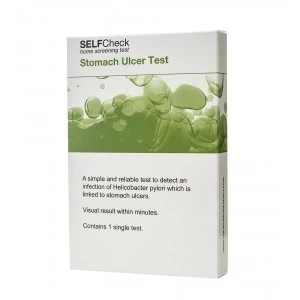H Pylori
Helicobacter pylori, or H. pylori, is a bacterium that damages the protective lining in the stomach. If the bacterial infection is left untreated, it can lead to digestive complications and could increase the risk of stomach cancer.
H. pylori is a common infection that is easily spread through human contact. Here, we’ll explore what H. pylori is, its symptoms, and how you can determine if you have been infected.
Helicobacter Pylori Test
- Immunological test
- Home test kit
- Detects specific antibodies
What is H. pylori?
H. pylori is a spiral-shaped bacterium that causes infection in around half of the world’s population. It can impact your gastrointestinal health because it can invade and damage the protective mucus layer in the stomach, leaving the stomach lining vulnerable to the harmful effects of stomach acid.
H. pylori is the most common cause of gastritis (inflamed stomach lining) and stomach ulcers, causing discomfort, pain, and nausea. Infection typically occurs during childhood and, without treatment, persists into adulthood.
What causes H. Pylori infection?
H. pylori infection is caused by the H. pylori bacteria entering the stomach. It has evolved to survive the harsh conditions within the stomach, which can cause infection.
H. pylori infection can be spread from person to person in several ways:
- Oral to oral: Spread by saliva from one person’s mouth to another, e.g., kissing
- Faecal to oral: Coming into contact with someone’s sick or poo, for example, if they haven’t washed their hands properly after using the bathroom
- Contact with contaminated food or water: H. pylori can be transmitted through contaminated food and water.
The risk of contracting H. pylori infection increases in areas where poor sanitation, overcrowding, or inadequate hygiene practices prevail.
H. pylori infection symptoms
Most people who contract H. pylori infection experience no symptoms. However, because H. pylori infection raises the risk of developing gastritis or stomach ulcers, you may experience the symptoms of these conditions.
These include:
- Feeling sick (nausea)
- Being sick (vomiting)
- Stomach pain or discomfort
- Indigestion
- Bloating
- Frequent burping
- Loss of appetite
H. pylori complications
H. pylori infections can cause complications in some people, such as:
- Ulcers: 85% of gastric ulcers and 95% of duodenal ulcers are caused by H. pylori infections. Around 10% of people with H. pylori will develop an ulcer because their stomach acid can create an open sore on their stomach lining.
- Inflamed stomach lining: Because H. pylori damages the stomach lining, it can cause irritation and swelling, commonly called gastritis.
- Stomach cancer: Some research shows that H. pylori is associated with an increased risk of developing stomach and oesophageal cancers.
How to test for H. pylori?
Testing for H. pylori usually begins with a consultation with a doctor to discuss your medical history, symptoms, and, if necessary, a physical examination. There are several tests available for diagnosing H. pylori:
- Urea breath test: H. pylori breaks down urea, so you’ll be given a urea-containing drink and your breath will be checked after to test for abnormal carbon dioxide levels, which will signal infection.
- Stool test to check for the presence of H. pylori in your poo.
- Blood tests can detect antibodies for H. pylori.
You can test for an H. pylori infection at home with our Helicobacter pylori test kit. The test is simple, quick, and effective. It requires a small blood sample, collected via a finger prick, and you’ll visibly see the results within 10 minutes.
How is H. pylori treated?
The first-line treatment for H. pylori infection is a combination of antibiotics and proton pump inhibitors (PPIs). For example, you may be prescribed a 7-day, twice-daily course that includes a PPI such as esomeprazole, amoxicillin (a broad-spectrum antibiotic), and a narrow-spectrum antibiotic like metronidazole.
The treatment you receive will depend on your medical history. For example, if you are allergic to penicillin, you may be prescribed alternative antibiotics, like clarithromycin and metronidazole.
Typically, a single course of antibiotics is sufficient to clear the infection. You may be given another test after your course has finished to make sure the bacteria have been eradicated.
How can H. pylori infections be prevented?
Several things can help protect you from becoming infected with H. pylori:
- Wash your hands frequently and thoroughly with warm, soapy water, particularly before and after handling food or using the bathroom
- Only drinking water from a trusted and safe source, especially if you are travelling abroad
- Cook food thoroughly to kill any bacteria, especially meat and seafood
- Avoid coming into close contact with anyone who may be infected or showing symptoms
Summary
Helicobacter pylori is a bacterium that can disrupt the stomach's lining, increasing the risk of stomach ulcers and gastritis. If left untreated, H. pylori can lead to complications, so it is essential to recognise the symptoms and understand the potential causes and how to protect yourself.
If you are experiencing any symptoms or have been in contact with anyone with an H. pylori infection, you can test yourself with our ‘Helicobacter pylori at-home test kit’.
Sources
Gastroenterology (2020). Risk Factors and Incidence of Gastric Cancer After Detection of Helicobacter pylori Infection: A Large Cohort Study.
National Cancer Institute (2023). Helicobacter pylori (H. pylori) and Cancer.
NICE (2019). Gastro-oesophageal reflux disease and dyspepsia in adults: investigation and management.
NIH (2023). Helicobacter Pylori.
Authored By

Leanne Edermaniger
Medical Content WriterPublished on: 08/11/2023
Reviewed By

Mohamed Imran Lakhi
MPharm - Lead PharmacistReviewed on: 08/11/2023
© 2013 - 2026 Al Muhsineen Limited. All Rights Reserved. Registered Pharmacy: 34 Halliwell Road, Bolton BL1 8RL. Registered Office: 254 First Floor, Shearbrow, Blackburn, England, BB1 8DS







